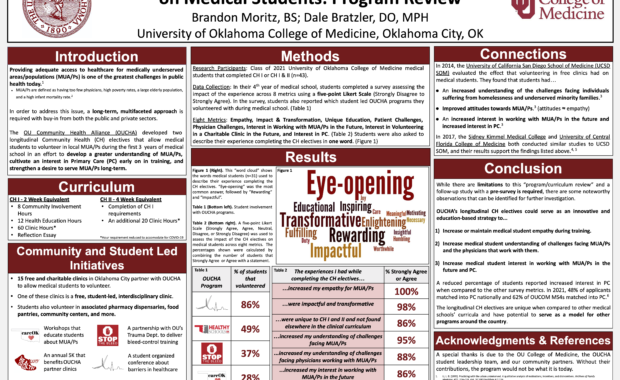It is common for frontline integrated healthcare workers to be consistently stretched thin at work, so they quietly, and sometimes not-so-quietly,
K09 – Advancing Interprofessional Team Leadership Expertise: The Interprofessional Team Activation Cycle
Interprofessional team-based care is an organizational mandate. Outcomes highlight the benefit of collective expertise in addressing the most complex
J08 – Interprofessional Simulation Training in Substance Use & SBIRT: Debriefing Outcomes and Lessons Learned
Background and Significance Utilizing simulation in health professions training has been connected to multiple training benefits. Yet, there is a
I08 – Individual and Organizational Strategies for Responding to Burnout in Primary Care Settings
We will share learnings from three organizational and individual strategies being implemented in Oregon to support primary care teams, including
E07 – Workforce Training from Pre-Professional Behavioral Health Clinician to Physician: Brief Behavioral Health Interventions for Chronic Pain as an Exemplar
Chronic pain is common in primary care. Twenty percent of adults report chronic pain and seven percent report high-impact chronic pain that
C06 – Expanding Interprofessional Teams: Training Future Healthcare Professionals in Screening, Brief Intervention, and Referral to Treatment (SBIRT)
Substance misuse persists and is under-treated across the United States (SAMHSA, 2021). Further enhancing the skill sets and capacity of diverse
C02 – It Takes a Village: Development and Evaluation of Employee Wellness Program (JeffBeWell) in Response to COVID-19
During the COVID-19 pandemic, Jefferson Health recognized a critical need to develop mental health and coping support for employees, specifically
A02 – So you Want to Treat Mental Health Concerns by Playing on your Phone?: Augmenting Provider Digital Aptitude in Integrated Primary Care
Mobile apps can provide a means to address healthcare disparities and combat common barriers to accessing psychiatric care experienced by underserved
Webcast 05 – Development of a New Behavioral Health Opioid ECHO Program to Promote Evidence-Based Care of Opioid Use Disorders in Rural Alabama
This presentation will provide details on the creation of an integrated behavioral health provider-training program for rural northwest Alabama that
Poster 22 – Impact of a Longitudinal Community Health Elective on Medical Students
INTRODUCTION: Providing adequate access to healthcare for medically underserved areas/populations (MUA/Ps) is one of the greatest challenges in public
C07 – Building Addictions Capacity in Ontario Using the ECHO Model During COVID-19
The COVID-19 pandemic has had a disproportionate impact on individuals who use substances (IWUS). Increased risk of infection and overdose, combined
Web01 – Development of a New Behavioral Health Opioid ECHO Program to Promote Evidence-Based Care of Opioid Use Disorders in Rural Alabama
This presentation will provide details on the creation of an integrated behavioral health provider-training program for rural northwest Alabama that
DG102 – Building Empathy to Enhance Medical Students’ Patient Perspective Taking: Considerations for Healthcare Inequities and COVID-19
Experiential or simulated teaching of patient health conditions and associated treatments is becoming an increasingly utilized method of instruction
L02 – Using Simulation to Teach Shared Decision Making to Primary Care Providers
Patient-centered care has become a dominant focus of the clinical interaction, yet related concepts like shared decision making (SDM) are
I05 – Early Career Training Needs for a Workforce Pursuing Equity in Primary Care Services
The goals of most systems pursuing integrated health care include recruiting, training, and retaining primary care staff capable of delivering
J04 – The Role of a Relational Leadership Framework in Advancing the Integration of Behavioral Health Care into Ob/Gyn Settings
Relational Leadership (RL) skills have been a significant enabling factor in growing behavioral health integration at Women's Healthcare Associates
K03 – Building Rapport with Children & Adolescents in Telehealth Practices
The COVID-19 pandemic has drastically shifted how professionals have provided mental health services across various settings. The practice of
G05 – Training Integrated Primary Care Behavioral Health Providers Virtually: Ensuring Fidelity, Promoting Equity, and Reducing the Digital Divide
VHA is a leader in developing competency-based training for integrated primary care behavioral health providers. From late 2017 through early 2020,

